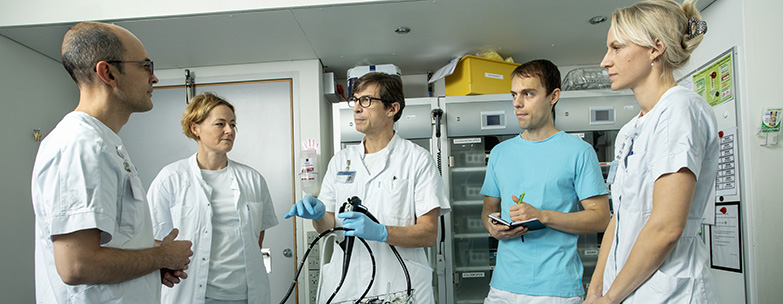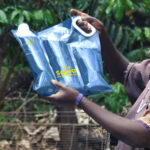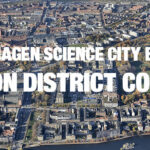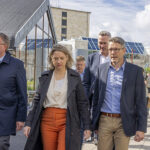Innovation-fellows identify pressing needs at Rigshospitalet University Hospital
Innovation in a hospital has impact on thousands. Patients as well as health professionals. Hospitals need to keep up productivity, but adding the factor of human care complicates everything. The innovation and entrepreneurship education “BioMedical Design Novo Nordisk Foundation Fellowship Programme” is now training a group of professionals to spot what needs to be done to balance efficiency and hospital care. Their learning journey began at Copenhagen Science City-based University Hospital Rigshospitalet. By Katrine Lind
Needs-led and interdisciplinary
During the autumn of 2019, two teams from the programme shadowed doctors and nurses for four weeks at the busy departments of nephrology (kidney diseases) and gastroenterology surgery (stomach and intestines). They were observing the daily routine of staff as a so-called clinical immersion phase which is an essential part of the training. The students, or fellows, as they are known in the programme, work in interdisciplinary teams of four, where health professionals team up with other specialists. Some are engineers or designers. Some have business backgrounds. Fellow and Medical Doctor Cecilie Ammitzbøll enjoys the variation in backgrounds, “We can all see the same, but it’s as if we wear different glasses.”
From hundreds of needs to four
A need is defined as a gap between what one does, and what one wishes to obtain as a clinical outcome. In that sense, you can view needs as possibilities for creating new value. By December, the teams have spotted hundreds of needs in the hospital, but only a few will lead to business ideas or indeed to real changes. The teams have spent hours discussing the potential of each need. Many are solely related to local workflows. Only a few can be turned into tangible products with a commercial potential.
Fellow Rastislav Monošík, who is a bioanalytical chemist, explains, “I don’t think it was difficult to spot needs, imperfections and problems, but what is much more challenging is whether we can build a business of it.”
Hard or soft needs
Fellow Chris Gibbs is an engineer. He expected to solve every need with technology, but that turned out not to be the case. “You see a lot of cool things happening in surgery and endoscopy, and so I’m thinking; there must be some tech opportunities here, right? When I look at the needs we are narrowing it down to now, they are kind of…”
Fellow Marie Parslov, who is a nurse, laughs, “soft needs?”
Chris, “Technology neutral. They are not about technology at all. It’s a soft need in that sense.”
Cecilie, the doctor ads: “Quite a few of our high priority needs are patient related. It is a dilemma. We want to find good solutions to doctor related needs. To their daily work routines. But there are a lot of patient related needs out there, and we can’t help circling around them.”
The clinic benefits from fresh eyes
When asking MD, Ph.d. and Head of Department of Surgery at Gastroenterology, Jens Hillingsø, what a group of interdisciplinary external innovators can do at his ward, he says, “people from outside the hospital can ask questions we don’t dare to ask for fear of sounding ignorant. We have taken part in some great innovation at our department. Always on a scientific background or from small start-ups. In a way, that is how I see the BioMedical Design program. We get great outcomes from the interdisciplinary work, and that is why I think the fellowship is interesting. It’s important to get away from thinking in silos and to start acknowledging different views”.
Next steps
The teams will spend the weeks up to Christmas selecting needs with a commercial potential. In turn, these will be validated at other hospitals both in Denmark and abroad. In early 2020 fellows will be trained in creative and commercial skills and start building prototypes and crafting business plans.
Needs which have turned out to be workflow related, are being communicated back to the clinic. Here, an Open Innovation Officer from BioMedical Design will help the hospital staff select and implement their preferred solutions during spring 2020.
What BioMedical Design is
BioMedical Design Novo Nordisk Foundation Fellowship Programme is a new fellowship for health innovation and entrepreneurship. The programme educates future innovation leaders to solve pressing needs at Danish hospitals. The programme is run in collaboration between Aarhus University and University of Copenhagen. It is funded by the Novo Nordisk Foundation. Deadline for the next applications round is February 1st 2020.




